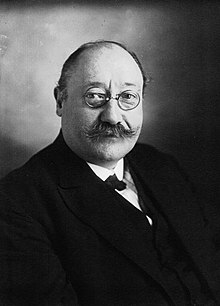Pierre Renaudel
Pierre Narcisse Renaudel (born December 19, 1871 in Morgny-la-Pommeraye , Département Seine-Maritime , † April 1, 1935 in Sóller , Mallorca ) was a French journalist and socialist politician in the Third French Republic . Renaudel sat on the Central Committee of the French League for Human Rights . The reformer Renaudel rejected Marxism as an ideology that was too rigid. In 1930 Renaudel appeared in the Socialist Workers' International as a neo-socialist .
Live and act
Pierre, the son of a teacher couple, was already interested in politics while attending school in Rouen and was influenced by the Blanquist Edmond Bazire . During his subsequent training as a veterinarian in Alfort , he became an admirer of Jaurès ; admires his publications on the Dreyfus affair . From December 1899, Pierre Renaudel became a Jaurès supporter in the predecessor parties of the socialist party SFIO . In 1905 he joined the left wing of the latter party. From 1907 Pierre Renaudel worked his way up to Jean Jaurès in L'Humanité . After the murder of the war opponent Jean Jaurès by the French nationalist Raoul Villain on the eve of the war , Pierre Renaudel took over the management of the paper and remained editor-in-chief until the end of the war.
Pierre Renaudel worked for the International after the war . At the conference of socialist and social democratic parties in Bern in early February 1919, he and Kurt Eisner signed a resolution in favor of prisoners of war. Participants from 21 countries want to build on the Second International .
At the end of 1920 at the SFIO congress in Tours , Pierre Renaudel and Léon Blum voted against French joining the 3rd International and founded the Groupe de la vie socialiste (group of socialist life), which Marcel Déat also joined .
From 1914 to 1919 and from 1924 until his death, Pierre Renaudel was elected to the French Chamber of Deputies as a member of the Socialists in the Var department . During the legislative periods of 1924, 1928 and 1932 he was on the board of commissions dealing with the areas of armament, finance, aviation, administration and voting rights. In particular, he prepared draft laws for the reorganization of the armed forces, but also dealt with women's suffrage and the abolition of the death penalty in 1927, with arms control in 1929 and repeatedly with colonial and foreign policy.
In November 1933, Pierre Renaudel split off from the SFIO and founded the radical neo-socialist Parti socialiste de France-Union Jean Jaurès (PSdF) , among others with the above-mentioned Marcel Déat and Adrien Marquet . Under the motto “Ordre, autorité et nation” (order, authority and nation), these right-wing socialists want to get closer to the bourgeois parties, especially the supporters from the middle class. Pierre Renaudel falls out with the party leadership and leaves the board. He wanted to cure himself seriously ill in the Balearic Islands at the end of 1934 and died there a few months later.
relationship
- His daughter Thérèse Renaudel married the engineer Claude Bonnier in 1923.
Honor
Pierre-Renaudel-Platz in
Pierre-Renaudel-Strasse in
literature
- Richard Baumgarten: Comrade Renaudel, founder of neo-socialism . The blue booklet of December 1, 1933 (Vol. 13, No. 9), p. 287
- Pierre Renaudel died. Pariser Tageblatt of April 3, 1935 (Vol. 3 No. 477), page 1, column a
- Victor Schiff : Pierre Renaudel. Tragedy of a democratic socialist. Pariser Tageblatt of April 6, 1935 (Vol. 3 No. 480), page 1, column a
- Leon Trotsky : My life . Attempt an autobiography. Translated from the Russian by Alexandra Ramm . 543 pages. Dietz Verlag, Berlin 1990 (Licensor: S. Fischer, Frankfurt am Main). ISBN 3-320-01574-5 (p. 221, 20. Zvo and 8. Zvu as well as p. 225, 11. Zvu)
Web links
- Jean Jolly: biography entry at assemblee-nationale.fr (French)
- Literature by and about Pierre Renaudel in the bibliographic database WorldCat
- Entries in WorldCat
- Listed on HathiTrust
- Newspaper article about Pierre Renaudel in the 20th century press kit of the ZBW - Leibniz Information Center for Economics .
Individual evidence
- ↑ Wolfgang Benz: Politics in Bavaria 1919-1933 reports from the Württemberg ambassador Carl Moser von Filseck
- ^ Motion for a resolution Eisner / Renaudel
- ↑ see also Trotsky, Chapter Paris and Zimmerwald
| personal data | |
|---|---|
| SURNAME | Renaudel, Pierre |
| ALTERNATIVE NAMES | Renaudel, Pierre Narcisse (full name) |
| BRIEF DESCRIPTION | French journalist and socialist politician |
| DATE OF BIRTH | December 19, 1871 |
| PLACE OF BIRTH | Morgny-la-Pommeraye , Seine-Maritime department |
| DATE OF DEATH | April 1, 1935 |
| Place of death | Sóller , Mallorca |
